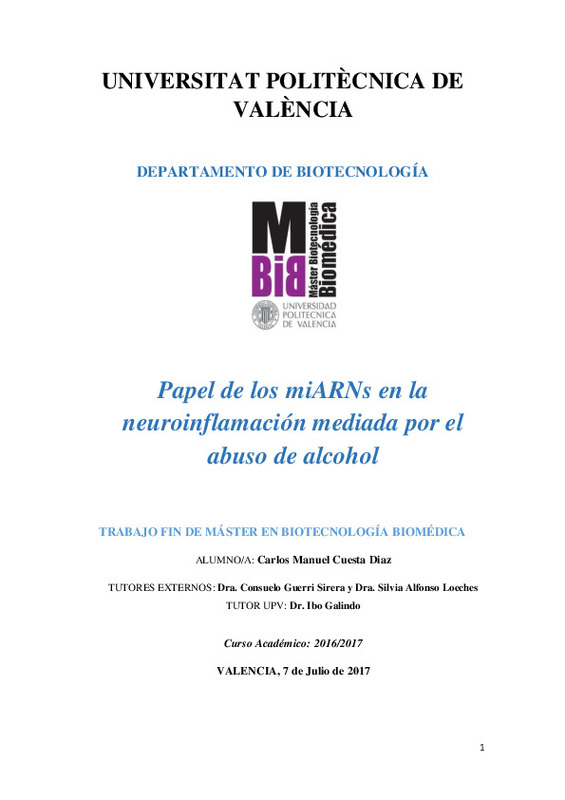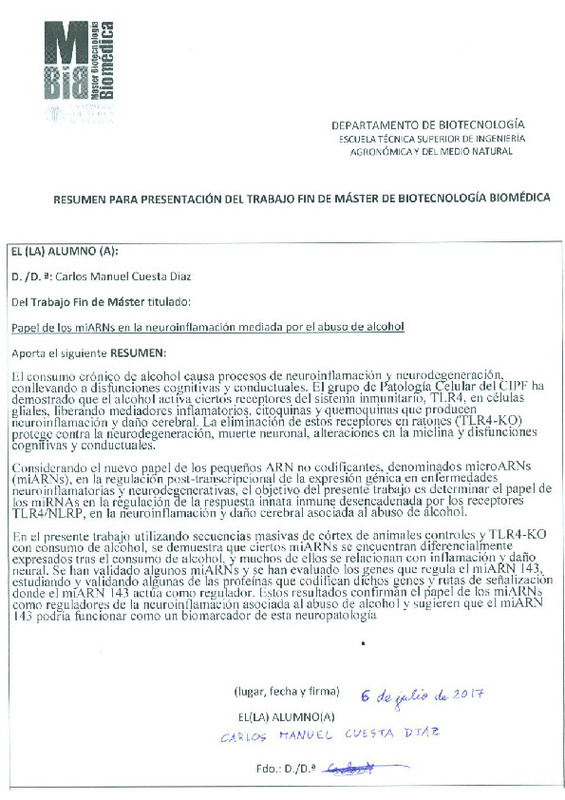|
Resumen:
|
Alcohol is a neurotoxic compound and its abuse can cause brain damage and cognitive dysfunctions, and in some cases, neurodegeneration. Although the neuropathological processes underlying these effects remain poorly ...[+]
Alcohol is a neurotoxic compound and its abuse can cause brain damage and cognitive dysfunctions, and in some cases, neurodegeneration. Although the neuropathological processes underlying these effects remain poorly understood, the Cell Pathology group of the CIPF has demonstrated that alcohol by interacting with membrane microdomains ¿lipid rafts¿ promotes the innate immune receptors, TLR4 signalling response in glial cells, triggering the release a cytokines, chemokines and inflammatory mediators and causing brain damage. In fact, it has been demonstrated that the elimination of the TLR4 receptors in mice (TLR4-KO) protects against ethanol-induced brain damage, neurodegeneration, neuronal death, myelin alterations, cognitive and behavioral dysfunctions.
Considering the new role of small non-coding RNAs, called microRNAs (miRNAs), in the post-transcriptional regulation of gene expression in neuroinflammatory and neurodegenerative diseases, the objective of the present work is to determine the role of miRNAs in the regulation of innate immune response triggered by TLR4 / NLRP receptors, in neuroinflammation and brain damage associated with alcohol abuse and their role as biomarkers in these processes.
The methodology includes isolating the fraction of small-sized RNAs (where miARNs are included) from brain cortex (one of the areas with the greatest susceptibility to alcohol abuse) of adult mice of the strain C57BL / 6 (WT) and C57BL / TLR4 - / - (TLR4-KO) with or without chronic alcohol treatment (10% v / v ethanol in drinking water for 2 to 3 months). Samples will be subjected to massive sequencing in search of miRNAs of interest, and after bioinformatic analysis, miRNA profiles will be evaluated to detect possible changes in the regulation of gene expression in conditions of chronic alcoholism with respect to untreated animals control. We will compare the miRNA profiles obtained between the WT / TLR4-KO groups, which will give us information about the possible alterations due to the genotype, whereas the comparison between the WT / WT + ETOH or TLR4-KO / TLR4-KO + ETOH groups will indicate the effects due to the treatment of alcohol. All the obtained miRNAs will be confirmed using quantitative real-time PCR (RT-qPCR) and the ones that are more relevant will be selected, studying the routes that regulate these miRNAs with their corresponding post-translational analysis at functional level. We will try to evaluate miRNAs of relevance in neuroinflammation in cerebral cortex and in plasma of animals treated chronically with ethanol. These studies will allow us to establish biomarkers of neuroinflammation associated with alcohol abuse.
[-]
El consumo crónico de alcohol causa procesos de neuroinflamación e incluso neurodegeneración, conllevando a disfunciones cognitivas y conductuales. Aunque los mecanismos moleculares de la toxicidad del etanol no están ...[+]
El consumo crónico de alcohol causa procesos de neuroinflamación e incluso neurodegeneración, conllevando a disfunciones cognitivas y conductuales. Aunque los mecanismos moleculares de la toxicidad del etanol no están totalmente esclarecidos, el grupo de Patología Celular del CIPF ha demostrado que el alcohol mediante la interacción con microdominios de membrana denominados ¿lipid rafts¿ activa ciertos receptores del sistema inmunitario, TLR4 en células gliales, liberando mediadores inflamatorios, citoquinas y quemoquinas que producen neuroinflamación y daño cerebral. Además, esta neuroinflamación puede amplificarse por acción del inflamasoma NLRP3, receptor citosólico del sistema inmunitario. De hecho, se ha demostrado que la eliminación de estos receptores en ratones (TLR4-KO) protege contra la neurodegeneración, muerte neuronal, alteraciones en la mielina y disfunciones cognitivas y conductuales.
Considerando el nuevo papel de los pequeños ARN no codificantes, denominados microRNAs (miARNs), en la regulación post-transcripcional de la expresión génica en enfermedades neuroinflamatorias y neurodegenerativas, el objetivo del presente trabajo es determinar el papel de los miRNAs en la regulación de la respuesta innata inmune desencadenada por los receptores TLR4/NLRP, en la neuroinflamación y daño cerebral asociada al abuso de alcohol y su papel como biomarcadores en estos procesos.
La metodología incluye aislamiento de la fracción de los ARNs de pequeño tamaño (donde se incluyen lo miARNs) de corteza cerebral (una de las áreas que presenta mayor susceptibilidad al abuso de alcohol) de ratones adultos de la cepa C57BL/6 (WT) y C57BL/TLR4-/- (TLR4-KO) con o sin tratamiento crónico de alcohol (etanol al 10% v/v en el agua de bebida, durante 2 a 3 meses). Las muestras se someterán a secuenciación masiva en busca de miARNs de interés, y tras el análisis bioinformático, se evaluarán los perfiles de miARNs para poder detectar posibles cambios en la regulación de la expresión génica en condiciones de alcoholismo crónico con respecto a los animales no tratados control. Se compararán los perfiles de miARNs obtenidos entre los grupos WT/TLR4-KO, que nos darán información de los posibles alteraciones debidas al genotipo, mientras que la comparación entre los grupos WT/WT+ETOH o TLR4-KO/ TLR4-KO+ETOH nos indicará los efectos debidos al tratamiento de alcohol. Todos los miARN diana obtenidos se confirmaran utilizando PCR cuantitativa a tiempo real (RT-qPCR) y se seleccionarán los que presenten mayor relevancia, estudiando las rutas que regulan estos miARN con su correspondiente análisis post-traduccional a nivel funcional. Trataremos de evaluar miRNAs de relevancia en neuroinflamacion en corteza cerebral y en plasma de animales tratados crónicamente con etanol. Estos estudios nos permitirán establecer biomarcadores de neuroinflamación asociada al abuso de alcohol.
[-]
|








